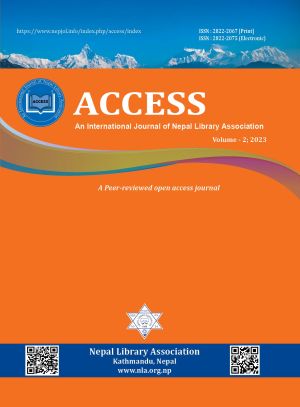Quantitative Research Approach and its Applications in Library and Information Science Research
DOI:
https://doi.org/10.3126/access.v2i01.58895Keywords:
Quantitative research, Research methods, LIS research, Survey research, Descriptive research, Library information scienceAbstract
This paper discusses the quantitative research approach and how it applies to Library and Information Science (LIS). Although many different research methodologies are used in the diverse subject of LIS to analyze data, the quantitative approach infrequently preferred. Quantitative research is most appropriate for phenomena stated in numbers since it requires numerical measurements and the analysis of variables to get results. The most common quantitative research techniques employed in LIS nowadays are survey studies, correlation research, descriptive research, and experimental research. To assess many facets of library activities and user satisfaction, the current study scientifically examines numerous quantitative research methods, including checklists, structured interviews, and questionnaires. Researchers can examine the effect factors of scholarly communications thanks to the study's insights into biblio metrics, sciento metrics, info metrics, web metrics, and altmetrics for research trends in metric studies. The study also highlighted the advantages, disadvantages, and limitations of quantitative research methodologies when researchers use this strategy.
Downloads
Downloads
Published
How to Cite
Issue
Section
License

This work is licensed under a Creative Commons Attribution-NonCommercial 4.0 International License.




